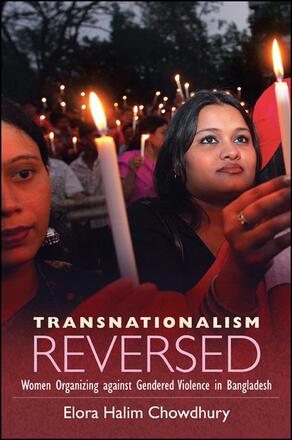
Transnationalism Reversed
Women Organizing against Gendered Violence in Bangladesh
Alternative formats available from:
Examines transnational movement building through a focus on acid attacks and organizing against acid violence in Bangladesh.
Description
Winner of the 2012 Gloria E. Anzaldua Book Prize presented by the National Women's Studies Association
Acid attacks against women and girls have captured the attention of the global media, with several high-profile reports ranging from the BBC to The Oprah Winfrey Show. In Bangladesh, reasons for the attacks include women's rejection of sexual advances from men, refusal of marriage proposals, family or land disputes, and unmet dowry demands. The consequences are multiple: permanent marks on the body, disfiguration, and potential blindness. In Transnationalism Reversed, Elora Halim Chowdhury explores the complicated terrain of women's transnational antiviolence organizing by focusing on the work done in Bangladesh around acid attacks—and the ways in which the state, international agencies, local expatriates, US media, Bangladeshi immigrants in the United States, survivor-activists, and local women's organizations engage the pragmatics and the transnational rhetoric of empowerment, rescue, and rehabilitation. Grounded in careful ethnographic work, oral history, and theoretical and filmic analysis, Transnationalism Reversed makes a significant contribution to conversations around gendered violence, transnational feminist praxis, and the politics of organizing—particularly around NGOs—in the global South.
Elora Halim Chowdhury is Associate Professor of Women's Studies at the University of Massachusetts Boston.
Reviews
"The book has deservedly garnered high praise since its publication … an excellent and accessible teaching resource. " — hypatia
"This book promises much and in my view, it delivers … The book is well written and well argued, and balances theory with real cases and historical circumstances … it is one of the best monographs on feminist transnational praxis I have recently read. " — Tonia St. Germain, H-Net Reviews (H-Genocide)
"…a thoughtful, engaging, and sharp analysis … While Elora Chowdhury draws on and contributes to a feminist scholarship that privileges accountability and solidarity in understanding women's struggles through their own experiences, she distinguishes herself by her treatment of sensitive subject matter, self-reflexivity on insider/outsider ethnography, and the ability to be critical of, yet respectful to those whose narratives she relates … It is a welcome addition to gender studies, feminist ethnography, development studies, and transnational feminist studies. " — Gender and Development
"This book is an outstanding exploration of the complexities and contradictions of women, gender justice, and feminist organizing in the global South—and of the ways in which these initiatives and campaigns enter the discourse of 'transnational feminism. '" — Piya Chatterjee, author of A Time for Tea: Women, Labor, and Post/Colonial Politics on an Indian Plantation
"This groundbreaking book will become an indispensable reference point for anyone thinking about transnational feminist practice, NGOs, and gender violence. Chowdhury's careful analysis of local and transnational campaigns against acid violence in Bangladesh is sharp and eye-opening. Scrupulously sensitive to the agency and experiences of actual women 'victims,' Chowdhury offers a compelling critique of the ways violence against women gets appropriated in international politics. " — Lila Abu-Lughod, author of Veiled Sentiments: Honor and Poetry in a Bedouin Society